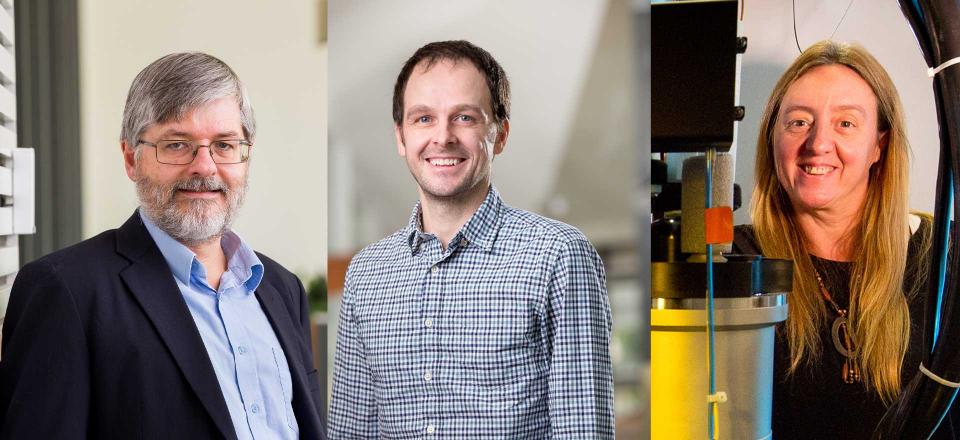Multi-million dollar grant for new ARC Training Centre announced today

14 July 2020
A $4.7 Million grant towards a $13 million ARC Industrial Transformation Training Centre (ITCC) has been announced today. You can read about it on the ARC website.
The “ARC Training Centre for Cryo-Electron Microscopy of Membrane Proteins for Drug Discovery” is a major collaboration of academic and industry partners and is led by Monash Institute of Pharmaceutical Sciences (MIPS), Monash University.
MIPS will be the headquarters of the new ARC Training Centre for Cryo-Electron Microscopy of Membrane Proteins for Drug Discovery, established in collaboration with Bio21, University of Melbourne, University of Wollongong, the Walter and Eliza Hall Institute of Medical Research (WEHI) and industry partners including SYNthesis spin-out Catalyst Therapeutics, Thermo Fisher Scientific, Biocurate, AstraZeneca, Pfizer, Genentech, Servier, Sanofi, Novo Nordisk and Dimerix Bioscience.
As you may guess, with the Ruth Bishop Building and Ian Holmes Imaging Centre due to be completed in 2020, Bio21 will play a major role in housing many of the CryoEM microscopes included in the ITTC centre. Eric Hanssen, who heads our Advanced Microscopy Facility, will also play a major role through his leadership of the platform that is soon to be relocated into the new Ian Holmes Imaging Centre.
"The strong relationship with MIPS and WEHI, as well as industry partners, will continue to bear fruit in this new ARC Centre. As we prepare to move our suite of EM microscopes into the Ian Holmes Imaging Centre, I envisage that Bio21 will be at the centre of CryoEM training and innovation," says Associate Professor Eric Hanssen, Manager, Advanced Microcopy Facility.
The ITCC is one of five new ARC Training Centres announced today and will be dedicated to enabling the power of cryo-electron microscopy to reveal membrane protein structures as a basis for structure-enhanced drug design.
MIPS researcher Professor Patrick Sexton will be the ITTC Centre Director and Associate Professor Denise Wootten will be the Monash Node Leader. Bio21’s Isabelle Rouiller, Mike Griffin and I are among more than 20 investigators involved across the collaborating organisations, bringing combined expertise in cryoEM microscopy, protein chemistry and structure-based drug design to the new centre.
The Node Leaders and academic CIs have extensive experience in managing large-scale, complex research programs across multiple sites, including with industry partners.
Isabelle Rouiller (Deputy Director, UoM node leader) is an Assoc. Professor in the Department of Biochemistry and Molecular Biology at UoM and leads a group at Bio21. She has a long standing, industry-funded collaboration with Medicago Inc (Canada), a partner in the new ARC ITTC centre, as well as previous experience with large scale research programs as a Group Leader (membrane protein biology) of the Fonds de Recherche Santé Québec (FRSQ) prior to moving to UoM.
Isabelle, Mike Griffin and the Parker group will be conducting a number of major training projects including ones involving pore-forming toxin complexes, ion channels, transporters, cytokine receptors and membrane proteins controlling viral and bacterial infection.
"CryoEM is an invaluable tool for structure-based drug and vaccine discovery and development with applications to a large number of human diseases. As an example, it can be used to investigate the structural 'lock and key' and other mechanisms that bacterial and viral pathogens use to invade cells. There is a dire need to train young researchers how to use cryoEM in their research. As Deputy Director of the new ARC Training Centre with more than 20 years’ experience in cryoEM, I will actively promote training of the next generation of scientists in collaboration with industrial partners to find solutions to important public health issues," says Associate Professor Isabelle Rouiller.
“The centre will provide excellent opportunities for graduate students interested in structural biology, membrane proteins and therapeutic design with world class facilities surrounded by exceptional expertise,” says Associate Professor Mike Griffin.
The ITTC will provide new links between academic and commercial partners, providing increased opportunity for generation of new IP and expansion of economic investment into the Australian biotechnology sector. It will have a major focus on training industry-ready Higher Degree Research candidates and postdoctoral fellows.
We are indebted to The University of Melbourne for their foresight and major investment in biological electron microscopy, particularly in funding the Ruth Bishop building and associated Ian Holmes Imaging Centre, recruitment of key academic champions such as Isabelle Rouiller and Debnath Ghosal and co-funding our Talos Artica and Titan Krios cryo electron microscopes. We thank our partners including MIPS, WEHI and CSL for their financial support of our cutting-edge microscopes and for MIPS housing their Glacios microscope at Bio21. Very importantly we would like to acknowledge the investment by the ARC, not only in the new ITTC Centre, but also in our Artica and Krios microscopes through ARC LIEF grants.
We look forward to closely working with our partners to train the next generation of researchers to use these powerful and extraordinary microscopes for drug discovery and design as part of this new centre.
Michael Parker
Director, Bio21 Institute

